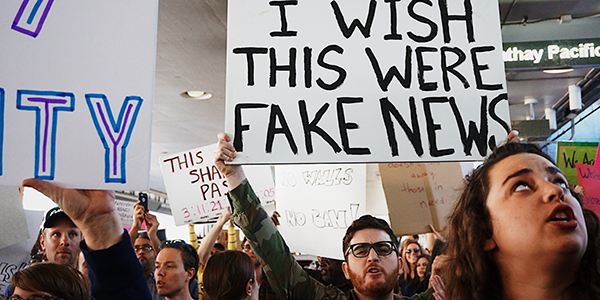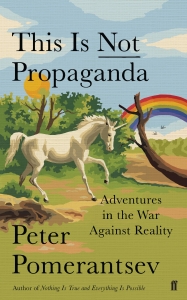Book Review | This Is Not Propaganda: Adventures in the War Against Reality by Peter Pomerantsev
In This Is Not Propaganda: Adventures in the War Against Reality, Peter Pomerantsev takes readers on a gripping journey through the disinformation age, drawing on his own family history as well as encounters with numerous figures positioned on both sides of the information spectrum: those working to manipulate our perceptions and those engaged in the struggle for a more facts-based public sphere. Ignas Kalpokas highly commends and recommends this elegantly written and compelling book that reveals the dizzying whirlwind in which reality is caught today.

Photo by Kayla Velasquez on Unsplash
This Is Not Propaganda: Adventures in the War Against Reality. Peter Pomerantsev. Faber & Faber. 2019.

Peter Pomerantsev’s This Is Not Propaganda is a book that packs a punch on quite a few different levels. While the market of books dealing with disinformation, fake news, post-truth, populism and other similar matters is becoming ever more crowded (perhaps even oversaturated), it stands out just like the unicorn that adorns its cover: a rare find.
The first thing a prospective reader should know about Pomerantsev is that he is a master storyteller. Hence, This Is Not Propaganda is a book that, given enough time, one could easily read from cover to cover in one go. It is elegantly and accessibly written, full of suspense (unsurprisingly, the subtitle indicates that this is a book of ‘adventures’), yet at the same time highly informative. Moreover, the book is intricately interlaced with Pomerantsev’s family story that involves his parents’ struggle to access forbidden information in the Soviet Union, their ordeal at the hands of the KGB and participation in the Cold War information effort following forced emigration – all serving as poignant reminders of how much, and simultaneously how little, has changed. In other words, the book is as aesthetically pleasing as the best works of fiction would be – except that it is highly factual.
Another key thing to stress is that, as the author notes straight away, this is not intended to be an academic book. And it certainly is not – it is composed of a series of accounts of interviews, meetings and chance encounters with people on both sides of the information spectrum: those whose aim is to manipulate our perceptions and those engaged in a struggle for a more facts-based public sphere, as well as the author’s own personal reflections. These are all snippets that do not necessarily fit tightly together like pieces of a puzzle, but it seems that the author did not have the aim of composing a full, definitive and tightly woven account of what he calls ‘war against reality’. Instead, the reader is provided with a patchwork of illustrations that reveal the scope (in terms of geography and methods) and the scale (in terms of efforts and effects) of this onslaught. Nevertheless, Pomerantsev is to be commended for his ability to move beyond the particular: the book is not an aggregation of separate (and often highly personalised) stories. Instead, each encounter reveals its own implications beyond itself, thus contributing to a better understanding of the present condition as a whole. This ability to oscillate between the particular and the universal is definitely the second major success of this book and of Pomerantsev as an author.
Meanwhile, the third commendation is for the author’s ability not to give in to all-too-easy categorisations and classifications. Instead, This Is Not Propaganda is a book of the noir genre, where almost nothing is clear-cut, often including the good and the bad, like a pro-democracy toolkit being successfully embraced by the far right or information warriors simultaneously advancing and hindering their own efforts. But in this lack of clear distinctions and identities, the book is fully representative of the time it is describing: much like the information environment of today, this is a book about different shades of grey, instead of the well-defined presence of black and white. Ultimately, almost everybody is involved and almost everybody is guilty, even if in very tiny and indirect ways. After all, we have collectively created the circumstances necessary for the present condition to take hold.
Structurally, the book is composed as a progression from multiple symptoms to some kind of diagnosis. The symptoms are mostly concentrated in the first three parts, in which the author takes us on a world tour through President Rodrigo Duterte’s Philippines, anti-government protesters in Mexico City, right-wing Identitarians in Europe, Russian troll factories, the Donbas region of Ukraine, global democracy activists in Serbia and many other places. On every occasion, though, the underlying themes remain the same: activists using social media, data analysis and similar techniques to fight oppressive governments, injustices (real or perceived) and manipulations as well as governments using no less technologically savvy means to manipulate populations at home and abroad, incite docility, fear or aggression and to silence (often through smear and disinformation campaigns as well) any dissenting voices. The picture that emerges is one of a dizzying whirlwind in which reality is caught today.
And it is this dizziness that the author aims to explain, at least to some extent, in the parts that follow. Bit by bit we start realising that this struggle over truth and reality is by no means the masterplan of some evil genius (although we do meet the usual suspects: Vladimir Putin, Donald Trump and the Brexiteers as well as the shadowy strategists behind them). Instead, Pomerantsev demonstrates that the war on reality is a consequence of post-Cold War technological and societal change. Disorientation, a lack of direction and fundamental oppositions, the crumbling of ideological identities and socio-economic statuses (such as class) and the loss of many more markers that would have underscored personal, group and even national identity – all of these are seen to play their part. Their combined effect is the hollowing out of truth and the desire for some new identities, even if temporary and makeshift (or, as Pomerantsev calls them, ‘pop-up’). Moreover, the technological capacity of political and other actors to segment their audiences into tiny groups, sense their affective proclivities and microtarget them with highly tailored messages is shown to have left us all easy prey. This structure of the book, and especially the examples that he provides, allows Pomerantsev to give a highly convincing account of the perturbations in today’s public sphere.
To conclude, This is Not Propaganda gives both aesthetic and intellectual joy while at the same time tackling issues (and often cases) that are highly disconcerting. And being so accessibly written, it should attract a broad audience both in academia and in the mass market. Overall, highly commendable, highly recommended.
The author of this book, Peter Pomerantsev, will be speaking at LSE on 5 November 2019 at the event ‘This is Not Propaganda’. More information about the event can be found here.
Note: This review gives the views of the author, and not the position of Democratic Audit. It was first published by the LSE Review of Books blog.
Ignas Kalpokas is currently assistant professor at LCC International University and lecturer at Vytautas Magnus University (Lithuania). He received his PhD from the University of Nottingham. Ignas’s research and teaching covers the areas of international relations and international political theory, primarily with respect to sovereignty and globalisation of norms, identity and formation of political communities, the political use of social media, the political impact of digital innovations and information warfare. He is the author of Creativity and Limitation in Political Communities: Spinoza, Schmitt and Ordering (Routledge, 2018).





 Democratic Audit's core funding is provided by the Joseph Rowntree Charitable Trust. Additional funding is provided by the London School of Economics.
Democratic Audit's core funding is provided by the Joseph Rowntree Charitable Trust. Additional funding is provided by the London School of Economics.